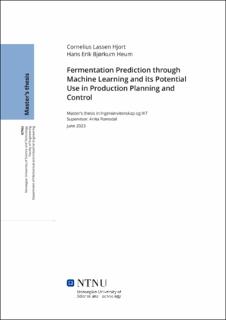| dc.description.abstract | Håndverksbryggerier står overfor en rekke utfordringer når det kommer til produksjonsplanlegging og -kontroll (PPC), hovedsakelig på grunn av komplekse og uforutsigbare produksjonspros- esser, kombinert med varierende etterspørsel fra kunder og produktets begrensede holdbarhet. Fermentering er den mest tidkrevende produksjonsprosessen og den mest kritiske. På grunn av fermenteringens variable varighet fører den til PPC utfordringer i bryggerier. Tidligere studier har utforsket hvordan fermenteringsprosessen kan bli mer forutsigbar ved hjelp av tradisjonelle metoder. Utviklingen av nye teknologier og økt antall mengde data tilgjengelig fører til et stort potensiale for bruk av maskinlæring.
Formålet med denne oppgaven er å undersøke hvor nøyaktig og hvor tidlig man i forkant kan predikere n ̊ar en fermenteringsprosess i øl er ferdig, og hvordan denne kunnskapen kan brukes til å redusere utfordringene som kommer av usikkerheten i fermentering. Oppgaven utforsker hvilke utfordringer fermenteringsusikkerheten fører til, og hvordan fermenteringsprognoser kan brukes til
å redusere dem.
Gjennom en teoretisk bakgrunn ide identifiserer vi de viktigste temaene i PPC og maskinlæring. Videre identifiseres viktige PPC aspekter i ølbryggerier gjennom en empirisk bakgrunn. Denne inkluderer også funn fra et case-studie som fokuserer på PPC i ølbryggerier. Relatert forskning blir også presentert.
Denne oppgaven utvikler fire maskinlæringsmodeller for å predikere når fermenteringsprosessen er ferdig. Et nevralt nettverk, to gradient boosted rammeverk og en automatisk ML-algoritme ble anvendt på datasett med 40, 60 og 80 timers informasjon om fermenteringsprosessen. De beste modellene predikerte mer nøyaktig enn en utviklet baseline-modell, som kun predikerte gjennom- snittet av dataen den trente på. Modellene har dog problemer med å predikere nøyaktig når batchen den predikerer på avviker fra normal fermenteringsaktivitet. Studien viser at en avgjørende faktor for gode prediksjoner når man bruker maskinlæring med IoT er et stort volum av data med høy kvalitet.
Vi gjennomførte et casestudie med et håndverksbryggeri for å få innsikt i deres næverende PPC aktiviteter. Som et resultat ble det identifisert at usikkerheten i fermenteringsprosessen bidrar til utfordringer knyttet til PPC. Som for eksempel å håndtere materialflyten, ineffektiv lagerstyring og unøyaktig produksjonsplanlegging. Disse utfordringene påvirker kapasitetutnyttelsen og den faktiske produksjonskapasiteten, siden hver produskjonssyklus blir forlenget. Det resulterer også til uvirksom tid i produksjonen og at produksjone tar lenger tid, som gjør at lagernivået øker.
Oppgaven viser at det er mulig og et stort potensiale til å få innsikt i fermenteringsprosesser ved å kombinere maskinlæring med industrielle sensorer. Denne innsikten kan skape betydelig verdi for ølbryggerier. Vårt studie legger grunnlaget for å faktisk implementere en maskinlæringsmodell i et bryggeri, og måle og evaluere verdiene det skaper. Studiet viser også at mer data med høy kvalitet er nødvendig. | |
| dc.description.abstract | Craft breweries face a multitude of challenges when it comes to production planning and control (PPC), largely due to the complex and unpredictable nature of their production processes combined with variable customer demand and the perishability of their products. Fermentation is the most time consuming production process and arguably the most critical. It adds significant uncertainty due to its variable duration, which poses significant challenges for PPC in craft breweries. Despite inconsistent results from previous attempts to enhance fermentation predictability, emerging technologies allow real-time tracking of the process combined with more data, presenting a potential for machine learning applications.
The purpose of this study is to investigate the feasibility of accurately determining the completion of a beer fermentation process and how this knowledge could be employed to mitigate production planning and control issues related to fermentation process time uncertainty. The research delves deeper into whether machine learning methods can be used to predict how long beer fermentation takes. It also explores the challenges craft breweries face due to the uncertainty, and how fermentation forecasts can be used to reduce them.
A theoretical background is conducted to identify key elements of production planning and control in general, along with relevant aspects of machine learning. Furthermore, essential aspects of production planning and control in the beer production industry are further identified via an empirical background. This also includes findings from a multiple case study focusing on production planning and control in craft breweries.
This thesis proposes four predictive models, using a number of input parameters to estimate the completion time of a fermentation process. A neural network, two gradient boosted forests and an automatic ML algorithm were applied to datasets of 40, 60 and 80 hours of information in the fermentation. The best models were more accurate than a baseline model that predicted the average. However, the models are struggling to predict accurately on batches that deviate from normal fermentation activity. Additionally, the study revealed that access to a substantial amount of data with high quality is an important factor when using machine learning combined with IoT.
A single case study involving one participating craft brewery is conducted to understand the current state of its production planning and control activities. Followed by an analysis of the information collected by the case company. As a result, we identified that fermentation process time uncertainty contributes to several PPC challenges in craft breweries, such as managing the flow of material, effective inventory management and accurate production planning and scheduling. These challenges impact capacity utilization and the actual production capacity by prolonging each production cycle, thus limiting the amount a craft brewery can produce. Furthermore, it results in idle time in production and increased production throughput time, impacting the amount of inventory held.
Overall, we identified that it is possible to retrieve insights about the fermentation process by using machine learning combined with industrial sensors. Secondly, we identified that these insights could cause substantial value in a craft brewery. Numerous topics for further development are identified, most importantly to actually implement and monitor the value gain of a machine learning model in a real craft brewery, but also the retrieval of more data. | |
